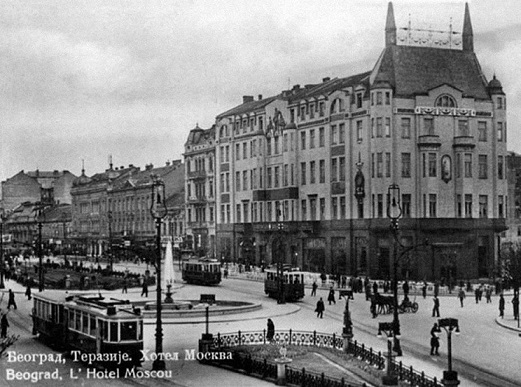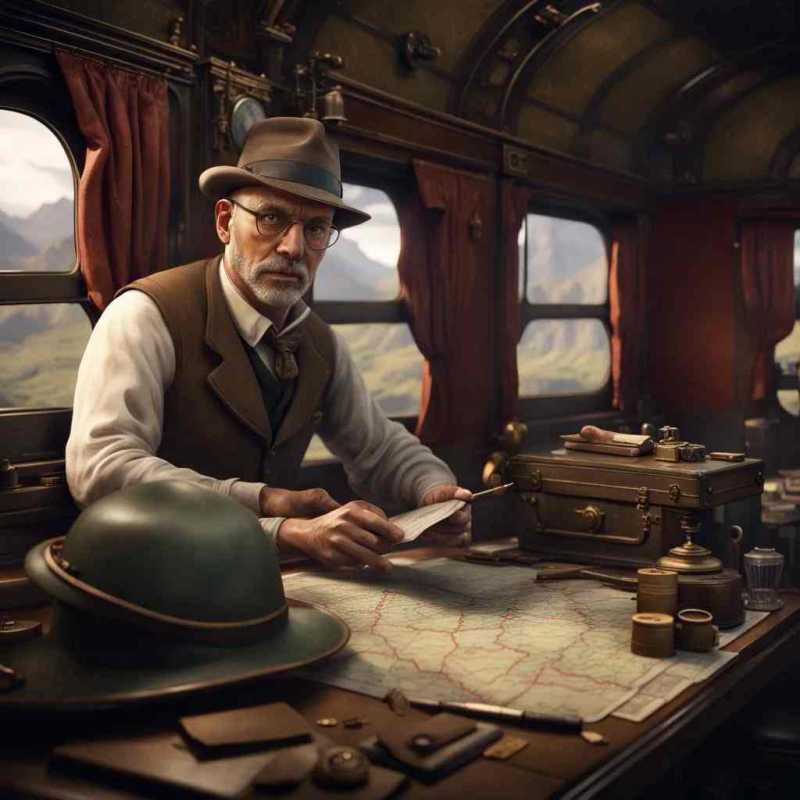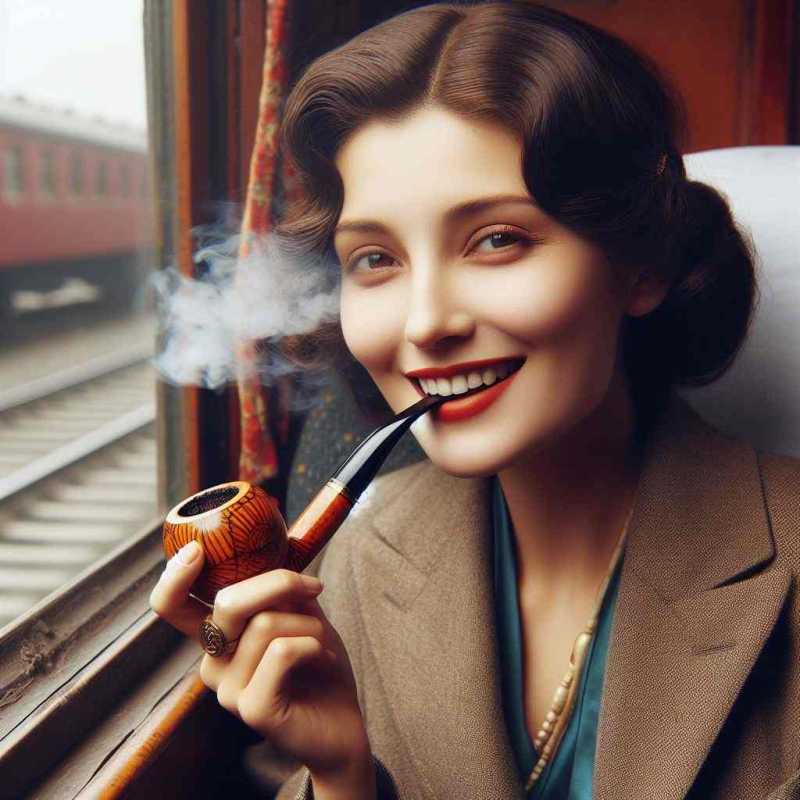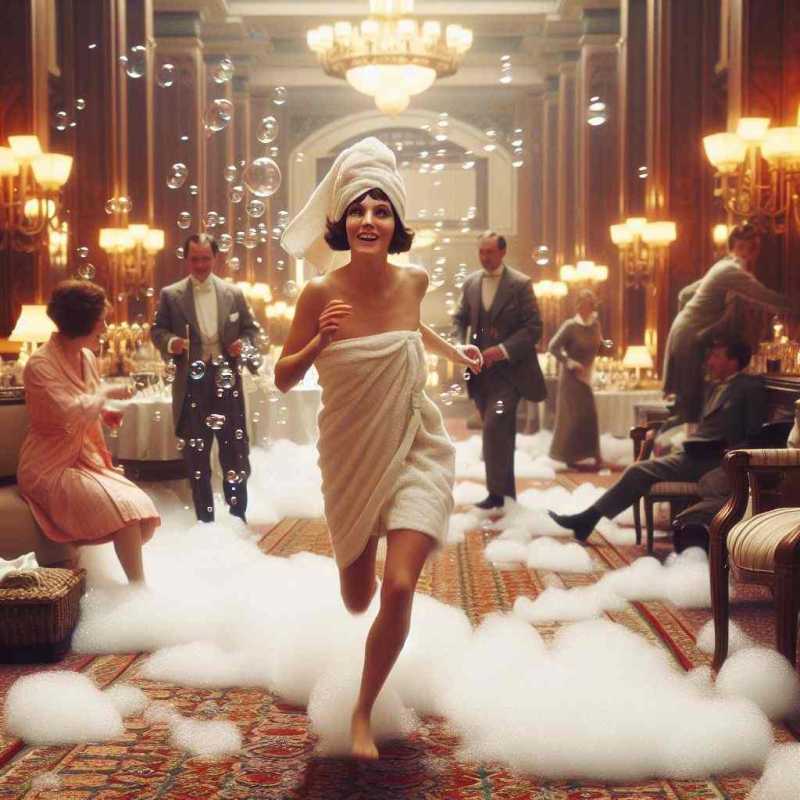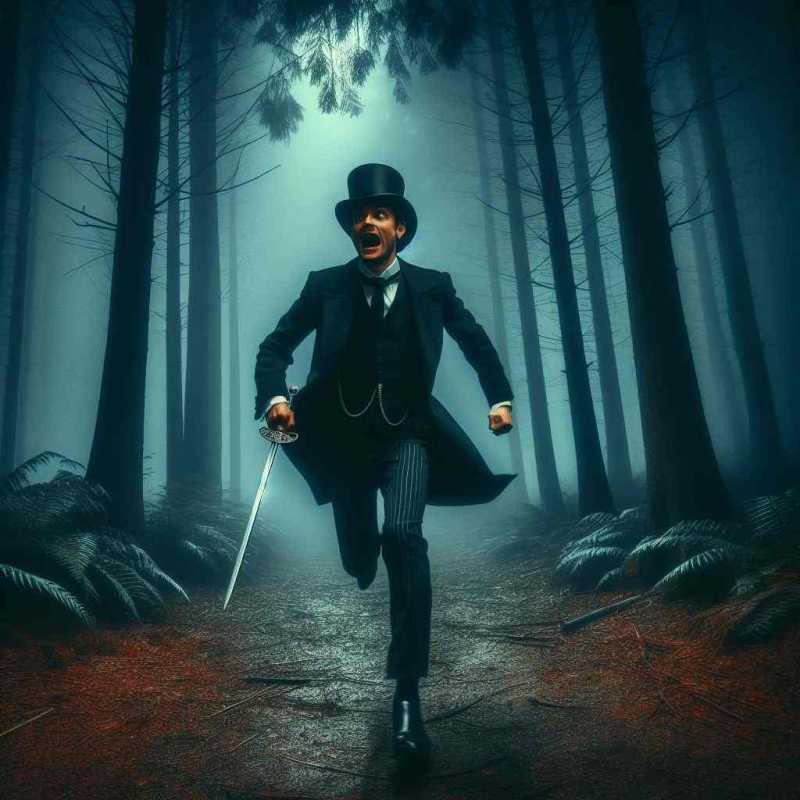Monday 11th February 1923 continued...
Orašac: From our position we can see
Orašac in the distance, basking in the late afternoon sun. We retrace our journey to reach the village before dark. On return to the village we look for
Father Kristijan. We find him in his church. He kneels, rocking back and forth, with tears running down his cheeks. He cradles a vague human shape in his arms. The shape is his wife,
Anna, but her lifeless form is shrivelled and desiccated.
Ludwig moves the priest to a pew and comforts him.
Banks investigates Anna's body. Her fate is that of
Kcerca. Banks recalls two nights ago, finding
Anna alone, and yet he had heard three distinct voices talking in strange tones. Speech and tones just like the words uttered by
Grandmother. Perhaps the trio formed a witches’ coven? Perhaps
Grandmother had somehow drained both
Anna and
Kcerca together to rejuvenate herself and power her spells?
Time to leave: We have what we came for. We have the right arm of the
Simulacrum. There’s no purpose in waiting until tomorrow. We are resolved upon getting back to
Belgrade without delay. Following a stiff drink of lethal home-distilled spirits at the mayor’s house,
Nedic agrees to take us to nearby
Arandjelovac from where we can catch a train. While we bump along the rough track in the back of his wagon,
Cartwright attempts to warn
Nedic of the dangers of the forest but for whatever reason, Nedic displays disinterest. Within view of Arandjelovac,
Nedic brings his horse to a halt. He is keen to turn for home before dark. It won’t take us long to walk the rest of the way. We reach the village just in time. A local train to
Mladenovac is due imminently. We soon find ourselves crammed into a carriage filled with singing peasants and poultry. God-like
George Banks (Praise Him!) is miffed that he isn’t drawing the lavish attention he deserves from his fellow passengers, but at least, as it’s getting dark, he can spend the journey admiring his reflection in the glass of the carriage window.
Back to normailty: We change trains at Mladenovac for
Belgrade and a couple of hours later we find ourselves in the relative comfort of the
Moskva.
Ludwig, exhausted from the day’s exertions, retires to his room early and crashes out to sleep-the-sleep-of-a-thousand-sleeps. Downstairs in the hotel bar,
Cartwright drinks himself into oblivion.
Banks goes to his room to admire his magnificent form in the full-length mirror and wonders why his right arm hurts so much.
Father Mika and
Pierre retire for the evening after a nightcap. And
Letty runs around the hotel naked for a while before ordering a case of champagne for herself from room service.
Hotel Moskva, Belgrade
Tuesday 12th February 1923
Onwards: It’s a weary band of investigators that assembles for breakfast next morning.
Letty is missing. She fails to come down to eat.
Ludwig and
Banks find her unconscious and naked in her bathtub. Luckily she doesn’t have her revolver to hand so the two men feel fairly safe in waking her. Half an hour later and
Letty joins everyone downstairs, wearing just a bathrobe (a complimentary Moskva bathrobe that she is brazenly stealing), a pair of boots that don’t match and a hat. Most importantly, she’s hauling the great heavy trunk containing the pieces of the
Sedefkar Simulacrum. The
Orient Express is due out of Belgrade at 10 o’clock. Let’s go.
Departure: Petar arrives, looking for one last hand out. He arranges for taxis to convey us and our luggage to
Belgrade Central. When we arrive, the
Orient Express is at the platform. We have a few minutes to engage a porter to put our things aboard the train. At 10.0 am precisely, the locomotive whistles loudly and the train steams and chuffs its way out of the station. The journey should be relaxing—we’re not due to arrive in
Sofia until 7 o'clock his evening. A few uneventful hours is just what we need.
A FUNNY THING HAPPENED ON THE WAY TO SOFIA
The Walker in the Storm: The sky outside darkens and storm clouds gather. Sheets of rain are hurled against the glass of our carriage windows, thunder rolls and lightning flashes. We look out in horror and amazement to see Grandmother’s cottage-on-legs in the adjacent fields, striding at pace alongside the Express. Riding on top of the loping cottage is the shadowy form of
Grandmother Baba Yaga, highlighted against the backdrop of the grey heavens by the lightning, her arms flung skyward. We all stare at her. She gestures back at us.
Banks, though initially distracted by his own handsome reflection, makes eye-contact and his jaw drops in motion of a silent scream. His mind snaps and he flees along the train in abject terror.
Letty, whose state of mind has deteriorated notably since our trip to the forest, laughs manically and lifts her shirt in an act of defiance, pressing her breasts against the window pane. And then the storm is lifted and
Grandmother and her cottage are gone. Perhaps they were never there? Simply a fragment of our fragile minds playing out a trick of mass hallucination?
Dr Jordanov: By late afternoon, with what passes for our new definition of normality resumed, we dress for an early dinner and descend upon the dining car. Across from us, we notice a tall man in an ill-fitted suit seated alone with a number of photos and documents spread out on the table before him. From what we can make out, the photos appear to depict an archaeological excavation. Intrigued,
Father Mika slips across to the man and introduces himself. It is now that we realise the photos are of the Crusader’s tomb in
Vinkovci – in fact much of what is on the table is the content of the strongbox that
Jazmina forwarded to
Dr Jordanov, Director of Ancient History at the National Archaeological Museum in Sofia.
Ludwig cleared his throat, “
Ahem. Dr Jordanov I presume?” The man is taken by surprise but affirms his identity.
“Indeed I am Radko Jordanov”. We explain who we are; that we are friends of
Jazmina and her recently deceased father,
Dr Moric. We know all about the strongbox and the importance of its contents.
A conversation with Dr. Radko Jordanov: Dr. Jordanov is in the grip of an exciting academic discovery. Among the medieval documents from
Vinkovci he found references to a strange statue recovered from a heretic named
Sedefkar. The description is remarkably like something a former student named
Ivo Penev discovered many years ago. Penev claimed to have purchased the head of a strange statue from a farmer. He called it the
Dzhudzheta Idol, after a mythological race of dwarves common to many Slavic creation stories.
Penev submitted a paper on his discovery to the National Archaeological Museum called
The Dzhudzheta Idol—Evidence of a Civilization Older than Mankind. The monograph claimed the statue was evidence of a pre-human civilization. It was rambling, poorly researched, and filled with wild speculations. The academic community rejected Penev’s paper, accusing him either of being the victim of a hoax or of trying to perpetrate one. Penev’s reputation was ruined and he left Bulgaria in disgrace shortly thereafter emigrating to Canada. He never discussed his former theory on the idol.
Dr. Jordanov has a copy of Penev’s monograph somewhere in his home in
Sofia. He’s unsure where the
Dzhudzheta Idol is now, but assumes it was given to another academic to verify Penev’s findings. Dr. Jordanov is confident he can locate the idol using the monograph and his academic contacts once they reach Sofia
The Phony Waiter: At this point our attention is drawn to some disgruntled passengers complaining about a drinks order mix up to a disinterested waiter. In fact the waiter seems less interested in correcting his mistake and more intent on listening in to our conversation. Realising he has been rumbled, the eavesdropping waiter makes a break for it. He forces his way past passengers and slashes with a knife at the maître d’hôtel who bars his exit from the dining car. Blood spills from the inflicted wound and panic fills the carriage.
Father Mika stays to attend to the maître d’ while the rest of us give chase.
The chase: Our quarry leads us into the next carriage, the baggage car. We have to put our shoulders to the connecting door to force our way through. The man has ditched his waiter’s jacket and picked up a satchel and a hatchet dripping with blood. We fear he has killed a genuine waiter to steal a uniform for his disguise. He throws the hatchet which glances Ludwig’s side. The chase continues into the final carriage of the train—the mail car. The man slides open the large side door. Air rushes in and the loud clickety-clack of wheels on track assaults our ears.
Cartwright draws his cane sword and rushes the man. The man leans out of the way of the thin flashing blade.
Pierre connects with a right hook, forcing the man backwards and he falls from the train through the open door.
The irrational fears of woods and woodland cottages: Cartwright pulls the emergency cord and the Orient Express screeches to a halt. The distance travelled before we come to a stop is enough to give the phony waiter a good head start. Still clutching his satchel, he has gained his feet in a field adjacent to the track and disappeared into a nearby wood.
Cartwright absolutely refuses to follow.
Pierre and
Ludwig climb down from the train and run after the man. By the time they reach the wood the man has had ample time to vanish. Pierre and Ludwig to try to pick up any trace of the man’s tracks. Only a short distance into the trees, they spy a lonely cottage in the wood.
Pierre and
Ludwig look at each other, suddenly afraid. Do you believe in déjà vu?
.
.
![]()


